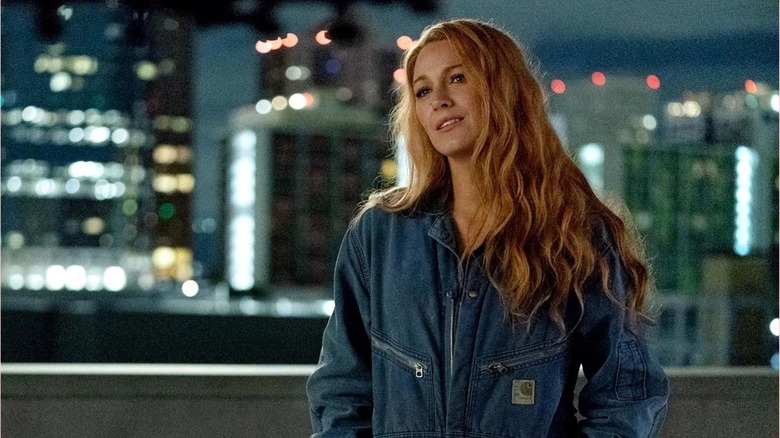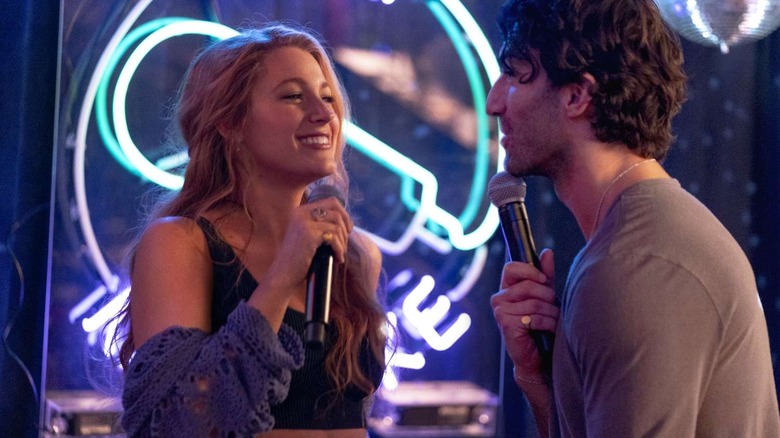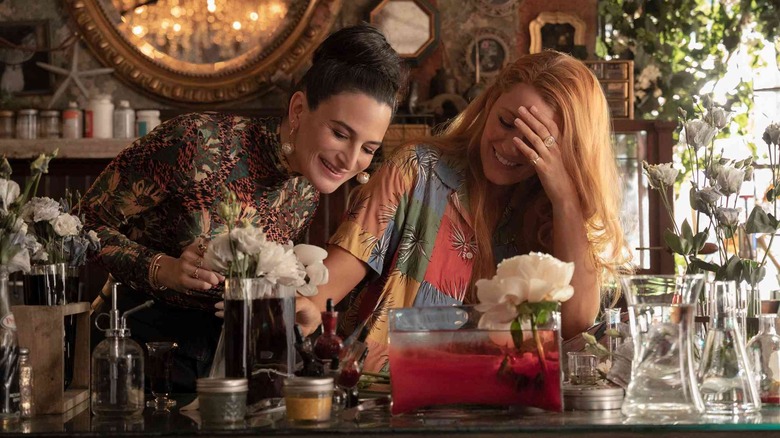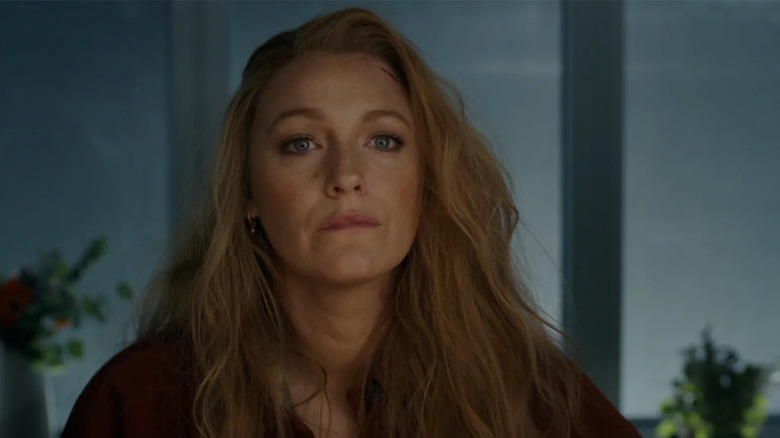It Ends With Us Review: Good Intentions And Committed Performances Can't Escape The Curse Of Colleen Hoover's Book
Justin Baldoni knows how to direct romance. His years of playing Rafael Solano on "Jane the Virgin" have equipped him with skills that give him an eye for intimacy, a full-bodied embrace of well-worn tropes guaranteed to make a Mother-Daughter movie night overflow with tears, and choosing actors who can make even the most nonsensical dialogue feel lived in. His previous films, "Five Feet Apart" and "Clouds," fall under the same teenage illness romance umbrella, but "It Ends With Us" is only arguably an adult story, as author Colleen Hoover seemingly wrote the book in the format of "YA romance, but this time they're adults!" Baldoni's biggest canvas yet gives the massive challenge of adapting one of the most popular books of the decade for a major studio, all while co-starring as the male lead and juggling the trickiest subject matter of his career.
Blake Lively stars as aspiring florist Lily Blossom Bloom, a character name that begs to be mocked but is acknowledged as being silly, providing the same meta-textual, self-deprecating humor as Lively's hubby in "Deadpool & Wolverine" but for ladies with Stanley cup collections. After a meet-cute on a rooftop with handsome neurosurgeon Ryle Kincaid (Baldoni), their romance evolves like the result of Hallmark movie Mad Libs ... until it doesn't. The seemingly perfect couple's traumatic childhoods manifest in violent outbursts from Ryle and Lily locked into a cycle of staying when she shouldn't.
The cruel twist of fate is that critiquing this movie feels simultaneously mandatory and impossibly unfair, where the slightest hint of pushback risks invalidating the survivors of abuse that connect to the material or welcoming the fierce wrath of Hoover's fanbase. But as a survivor of domestic violence myself, I'm grappling with a movie that gets so much right but is ultimately trying to grow a garden in the poisoned soil of bad source material.
Blake Lively deserves better than Lily Bloom
"It Ends With Us" is shown through the perspective and memory of Lily Bloom, with Blake Lively trying her damnedest to breathe life into a character that serves as the evolutionary next step following Bella Swan of "Twilight." She's basically a relatable, "quirky" woman with an established special interest (in this case, flowers) but without any other discernible traits, so it's easy for the audience to slip themselves into the role and feel like the main character. Lively's charm is infectious, but her performance is held back by "regular girl gets the unthinkably perfect guy" tropes embedded in the DNA of Hoover's story. Her penchant for gorgeous gowns paired with oversized, working-class men's jackets is our main indicator that she's Not Like Most Girls, so of course Ryle was going to break his "casual dates only" rule and risk it all to be with her.
Baldoni wisely lulls the audience into a false sense of security with said tropes, which makes the reveal of Ryle's behavior all the more jarring. He's handsome! He has a fancy apartment! He has a job that will impress moms! He's so secure in his masculinity that he'll wear a rainbow onesie to a bar that offers discounts for doing so! "It Ends With Us" wants the audience to fall in love with Ryle, because to do so makes it easier for people to see why it takes Lily so long to leave. It's the one strength of Hoover's book (which has the same approach) because the reality is that most abusive husbands aren't villainous monsters cloaked in shadows with accompanying swells of threatening music. They're a lot like Ryle, men who appear perfect in every way but are capable of horrific violence shrouded in apologies, promises, and psychological warfare. He's a master manipulator, further proven when her childhood love, Atlas (an underutilized Brandon Sklenar) reenters the picture and provides her an out that she doesn't take.
Romance tropes deflate the importance of the story
When I left my abusive ex and confessed the truth of what had been happening for years to our friends and loved ones, almost all of them berated themselves for not seeing the red flags. But the reality is that unless you know what to look for — and often even when you do know what to look for — it's still easy to miss.
Ryle's abuse of Lily escalates gradually over time and the constant blurring of boundaries and "understandable" justifications for his growing violations make it harder for her to see the forest for the trees. Ahead of Ryle's most violent act, he starts a game of manipulation, one that looked nearly identical, almost down to the exact phrasing, of an abusive tactic my ex had unleashed on me. All of my internal warning bells started firing off, and I was squirming in my seat watching what was, in my opinion, a very obvious sign that things were about to go very, very badly for Lily.
But the audience for my screening ... they laughed. Some were out of discomfort, I'm sure, but others were audibly laughing as if it were a funny situation. So much so that another viewer loudly let out a "BOO!" at the people who were laughing. It physically pained me to sit in that room, wanting nothing more than to crawl out of my skin — but the more I think about it, the more I can't blame the audience for their insensitivity. The bombardment of romance tropes, sex scenes shot like "50 Shades of Grey," a soundtrack tailor-made of "Songs for Empowered Women to Cry To," and melodramatic framing of Lily's deeply buried feelings for Atlas forces "It Ends With Us" into two distinct movies battling for supremacy. A weepy romance set to Taylor Swift being pulled apart is one thing, but a shockingly nuanced examination of domestic violence being diluted because of it is maddening.
The road to hell is paved with good intentions
The "abusive man with a troubled past" trope is tired (and bulls**t). The "quirky girl with her own successful business who gets the guy" trope is tired. And despite the immeasurable talent of Jenny Slate, the "loud best friend who provides comedic relief" trope is tired. What makes "It Ends With Us" special is the attempt to take a more realistic approach to domestic violence, but because the non-abusive story beats are pulled from the fantastical and idealized world of romance novels, the reality of this violence is constantly being uprooted. Some of the film's most poignant moments are in the flashbacks where Isabela Ferrer plays a young Lily (and a pitch-perfect portrayal of Lively's interpretation of the character), but the impact is often immediately deflated by thrusting audiences back into yet another wistful look out into the picturesque distance of Boston's cityscapes or Lily's maximalist floral shop.
It's frustrating, because there are so many survivors of domestic violence who love this story, who felt empowered by it, and in some cases, they felt strong enough to leave their abusers because of it. I honestly hope that the movie can do the same, and I do not bemoan anyone who walks out of the theater feeling emotionally moved ... but "It Ends With Us" can't escape the curse of Colleen Hoover's book. The message of "we break the pattern before the pattern breaks us" is important, and given Hoover's personal history of growing up in an abusive household, I hope working through those emotions through these characters has been healing. But as a movie, "It Ends With Us" is an infuriating, emotionally manipulative watch and a disservice to the talents of every actor involved.
If you or someone you know is experiencing domestic violence, the United States national hotline is available at 1.800.799.SAFE (7233) or text "START" to 88788.
/Film Rating: 4 out of 10.



